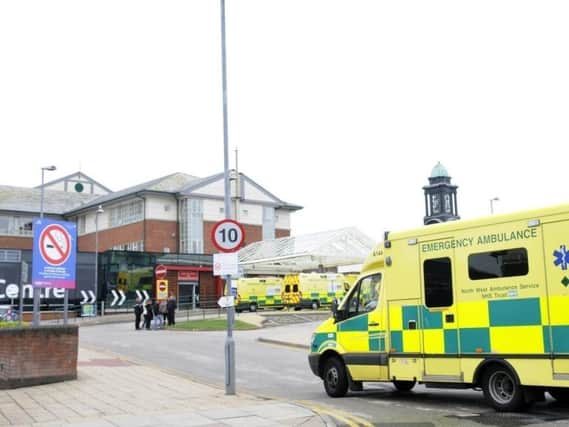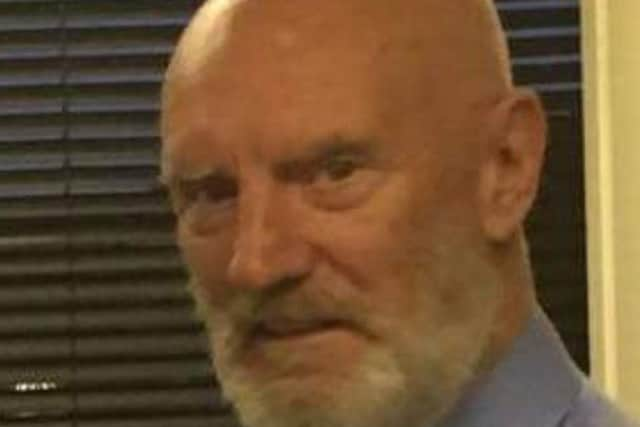‘Neglect’ at Blackpool Vic meant sepsis victim died when vital scans marked ‘urgent’ were not done


William Shaw, 69, of Kendall Avenue, had just a 28 per cent chance of survival when he was rushed into bowel surgery at Blackpool Victoria Hospital at 2.30am on May 4, 2018.
But an expert at his inquest said that he could have had an 87 to 89 per cent chance of survival had doctors operated earlier.
Advertisement
Hide AdAdvertisement
Hide AdCoroner Clare Doherty heard that Mr Shaw, a retired bakery operative, was suffering from abdominal pains when he arrived at Blackpool A&E at 5.15pm on May 2, last year, and was showing signs of an infection.


He should have been placed on the Vic’s sepsis pathway, but the junior doctor who saw him decided not to, resulting in a delay in antibiotics.
He was instead referred to a senior doctor for further examination.
At 9.10am the following day, the senior doctor ordered an urgent CT scan should be carried out, noting that Mr Shaw was suffering from suspected peritonitis - an infection of the abdomen that can prove fatal if left untreated.
Advertisement
Hide AdAdvertisement
Hide AdBut this was not done until shortly after midnight on May 4, revealing a bowel perforation believed to have been caused by a large ulcer.
He was taken in for a laparotomy to repair the severe perforation at 2.30am and suffered a cardiac arrest while under anaesthetic.
Doctors battled for 12 minutes to restore his heartbeat and the surgery was completed, however, operating doctor Thu Linn observed that sepsis was by this time well established.
Mr Shaw’s condition continued to decline and he died eight days later at 4.30pm on May 11 from multi-organ failure and septicaemia.
Advertisement
Hide AdAdvertisement
Hide AdIndependent expert Dr Simon Galloway, director of surgery at the Manchester University Trust, said that the hospital’s delay in carrying out the scan ‘undoubtedly’ contributed to Mr Shaw’s death.
“The fact that (the CT scan) wasn’t obtained in a timely manner meant there was a delay in surgery,” he said.
“Mr Shaw was seen at 9.10am on May 3, and it was noted there were features of peritonitis present and an urgent CT scan was requested.
“The clinical history stated acute general abdominal pain with vomiting and known previous peptic ulcer disease.
Advertisement
Hide AdAdvertisement
Hide Ad“Mr Shaw deteriorated during the day. At 10am the number score was three. It remained at three at 2pm. At 6pm it was four. By 7.40pm it was elevated to six and by 8.30pm it was seven. It was nine at 9.10pm.”
This, he said, indicated worsening sepsis.
He said that, based on the urgent report, Mr Shaw should have had his CT scan within one and two hours, and ideally should have been operated on by 1.30pm on May 3 - 13 hours before the surgery eventually took place.
He said: “On the balance of probability, I believe that he would have survived if he had had the operation at an earlier stage - 6pm at the latest.”
He also agreed that antibiotics should have been administered sooner in accordance with the Vic’s own sepsis pathway rules.
Advertisement
Hide AdAdvertisement
Hide AdHad he been placed on the sepsis pathway, Mr Shaw would have received antibiotics within one hour of being seen.
But he was not given them until 10pm the following day.
He had been prescribed the medication by a doctor that morning but it was overlooked and none was administered.
Vanessa Cashman, representing Mr Shaw’s family, said: “Mr Shaw should have been given antibiotics within one hour, and that means there was a 23-hour delay. The failure to give antibiotics, and the failure to carry out the CT scan for 19 hours after admission, are gross failings. We say that negligence is inescapable here.
“Even if surgery had been carried out at 6pm at the latest, Mr Shaw still would have survived.
Advertisement
Hide AdAdvertisement
Hide Ad“The effect of antibiotics and the delay in giving them meant that Mr Shaw’s weakened state before going into surgery had a significant effect on his mortality rate... Allowing him to become very unwell more than contributed to his death.”
Dr Peter Hayes, clinical manager at Blackpool Teaching Hospitals Trust, went against the hospital’s own internal review findings, which claimed that it was not possible to determine whether Mr Shaw could have been saved, to agree with Dr Galloway.
He believed individual failures were to blame for the neglect suffered by Mr Shaw, rather than systematic ones.
The hospital accepted that there had been failures in Mr Shaw’s care and that he should have been placed on the sepsis pathway.
Advertisement
Hide AdAdvertisement
Hide AdRichard Jolly, representing the trust, said: “We think its appropriate in this case to accept there are significant shortcomings. Assumptions were being made about steps being taken by colleagues that didn’t happen, and we have to accept that.
“Mr Shaw should have received antibiotics and the CT scan should have been carried out.”
He said that staff had reflected on their failures in this case.
Handing down a conclusion of natural causes contributed to by neglect, coroner Doherty said: “While in hospital there were a series of miscommunications with the result that several gross failures occurred and Mr Shaw’s condition deteriorated.
Advertisement
Hide AdAdvertisement
Hide Ad“A CT scan recorded on May 3, marked urgent at 9.10am, was not carried out until after midnight on May 4. As a result of this delay, emergency surgery was delayed, and this was to repair a perforated ulcer.
“By this time Mr Shaw had deteriorated to the point where at the time of surgery he was gravely ill. Mr Shaw died as his chances of mortality increased during the period. This gross failure directly contributed to his death.
“Antibiotics were not administered until 24 hours after admission. This most likely contributed to the loss of Mr Shaw’s physical resistance. Although the surgery was successful and he survived, he declined despite receiving a high level of care and support in ICU.”
Ms Doherty said she did not intend to write a regulation 28 letter to the hospital, but had observations that she would pass on to the hospital at a later date.
Advertisement
Hide AdAdvertisement
Hide AdCommenting on behalf of William Shaw’s family, medical negligence solicitor Diane Rostron said: “Mr Shaw suffered a number of complications over a period of a few days as a result of the hospital’s failings and he died just nine days after admission. The coroner’s verdict that he died of natural causes contributed to by neglect is extremely difficult for his family.
“It is disappointing and deeply saddening that another family have suffered due to the hospital’s continued failure to recognise and treat sepsis in a timely manner. Even when the need for antibiotics was first recognised, 11 hours after he was admitted, no one took responsibility for prescribing them, adding to the wholly unacceptable delay. Mr Shaw’s perforated ulcer was also perfectly treatable.
“Just one year ago, the same coroner made a finding of neglect following the preventable death of 45-year-old Paul Wilkinson who died as a result of delayed sepsis diagnosis at Blackpool Victoria Hospital. The hospital stated then that lessons had been learned.”